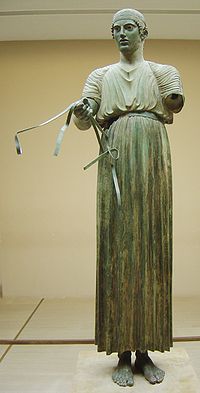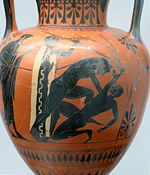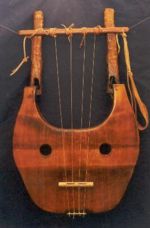
Epinikion
Encyclopedia

Ancient Greek
Ancient Greek is the stage of the Greek language in the periods spanning the times c. 9th–6th centuries BC, , c. 5th–4th centuries BC , and the c. 3rd century BC – 6th century AD of ancient Greece and the ancient world; being predated in the 2nd millennium BC by Mycenaean Greek...
ἐπινίκιον, from epi-, "on," + nikê
Nike (mythology)
In Greek mythology, Nike was a goddess who personified victory, also known as the Winged Goddess of Victory. The Roman equivalent was Victoria. Depending upon the time of various myths, she was described as the daughter of Pallas and Styx and the sister of Kratos , Bia , and Zelus...
, "victory") is a genre
Genre
Genre , Greek: genos, γένος) is the term for any category of literature or other forms of art or culture, e.g. music, and in general, any type of discourse, whether written or spoken, audial or visual, based on some set of stylistic criteria. Genres are formed by conventions that change over time...
of occasional poetry
Occasional poetry
Occasional poetry is poetry composed for a particular occasion. In the history of literature, it is often studied in connection with orality, performance, and patronage. As a term of literary criticism, "occasional poetry" describes the work's purpose and the poet's relation to subject matter...
also known in English
English language
English is a West Germanic language that arose in the Anglo-Saxon kingdoms of England and spread into what was to become south-east Scotland under the influence of the Anglian medieval kingdom of Northumbria...
as a victory ode
Ode
Ode is a type of lyrical verse. A classic ode is structured in three major parts: the strophe, the antistrophe, and the epode. Different forms such as the homostrophic ode and the irregular ode also exist...
. In ancient Greece
Ancient Greece
Ancient Greece is a civilization belonging to a period of Greek history that lasted from the Archaic period of the 8th to 6th centuries BC to the end of antiquity. Immediately following this period was the beginning of the Early Middle Ages and the Byzantine era. Included in Ancient Greece is the...
, the epinikion most often took the form of a choral lyric, commissioned for and performed at the celebration of an athletic victory in the Panhellenic Games
Panhellenic Games
Panhellenic Games is the collective term for four separate sports festivals held in ancient Greece. The four Games were:-Description:The Games took place in a four-year cycle known as the Olympiad, which was one of the ways the Greeks measured time...
and sometimes in honor of a victory in war. Major poets in the genre are Simonides
Simonides of Ceos
Simonides of Ceos was a Greek lyric poet, born at Ioulis on Kea. The scholars of Hellenistic Alexandria included him in the canonical list of nine lyric poets, along with Bacchylides and Pindar...
, Bacchylides
Bacchylides
Bacchylides was an Ancient Greek lyric poet. Later Greeks included him in the canonical list of nine lyric poets which included his uncle Simonides. The elegance and polished style of his lyrics have been a commonplace of Bacchylidean scholarship since at least Longinus...
, and Pindar
Pindar
Pindar , was an Ancient Greek lyric poet. Of the canonical nine lyric poets of ancient Greece, his work is the best preserved. Quintilian described him as "by far the greatest of the nine lyric poets, in virtue of his inspired magnificence, the beauty of his thoughts and figures, the rich...
.
Origins

Hymn
A hymn is a type of song, usually religious, specifically written for the purpose of praise, adoration or prayer, and typically addressed to a deity or deities, or to a prominent figure or personification...
s for Herakles, honored as the founder of the Olympic Games, were the original model for the athletic epinikion. Victory odes are also associated with the Dioscuri; Pindar uses the term "Castor-song" (Καστόρειον), and Polydeuces (Pollux), the mortal twin of Castor, was a boxer
Ancient Greek Boxing
Ancient Greek boxing dates back to at least the eighth century BC , and was practiced in a variety of social contexts in different Greek city-states. Most extant sources about ancient Greek boxing are fragmentary or legendary, making it difficult to reconstruct the rules, customs and history...
.
Although the best-known epinikia appear to have been composed for a chorus, they may have originally been performed by a soloist. Pindar says that a lyric
Lyric poetry
Lyric poetry is a genre of poetry that expresses personal and emotional feelings. In the ancient world, lyric poems were those which were sung to the lyre. Lyric poems do not have to rhyme, and today do not need to be set to music or a beat...
by Archilochus
Archilochus
Archilochus, or, Archilochos While these have been the generally accepted dates since Felix Jacoby, "The Date of Archilochus," Classical Quarterly 35 97-109, some scholars disagree; Robin Lane Fox, for instance, in Travelling Heroes: Greeks and Their Myths in the Epic Age of Homer , p...
was sung at Olympia, and a scholiast to the passage gives a quotation. The performance of these songs seems to have led in the 6th century BC to aristocratic commissions for more elaborate numbers.
The earliest epinikia, surviving only in fragments, were composed by Simonides of Ceos
Kea (island)
Kea , also known as Gia or Tzia , Zea, and, in Antiquity, Keos , is an island of the Cyclades archipelago, in the Aegean Sea, in Greece. Kea is part of the Kea-Kythnos peripheral unit. Its capital, Ioulis, is inland at a high altitude and is considered quite picturesque...
in the 520s BC. Simonides was the first professional poet known to write odes in honor of victorious athletes at the games; in antiquity, he was also notorious for being the first poet to charge a fee for his services. The epinikia of Bacchylides were formerly considered lost and were known only from quotations in other authors, until the discovery in the late 19th century of a papyrus
Papyrus
Papyrus is a thick paper-like material produced from the pith of the papyrus plant, Cyperus papyrus, a wetland sedge that was once abundant in the Nile Delta of Egypt....
manuscript
Manuscript
A manuscript or handwrite is written information that has been manually created by someone or some people, such as a hand-written letter, as opposed to being printed or reproduced some other way...
containing fifteen of his odes. Pindar's four surviving books of epinikia, called one of "the great monuments of Greek lyric," correspond to each of the four major festivals of the Panhellenic Games: Olympian, Pythian
Pythian Games
The Pythian Games were one of the four Panhellenic Games of Ancient Greece, a forerunner of the modern Olympic Games, held every four years at the sanctuary of Apollo at Delphi....
, Isthmian
Isthmian Games
The Isthmian Games or Isthmia were one of the Panhellenic Games of Ancient Greece, and were named after the isthmus of Corinth, where they were held...
, and Nemean
Nemean Games
The Nemean Games were one of the four Panhellenic Games of Ancient Greece, and were held at Nemea every two years ....
. Many of Pindar's odes can be identified by event, champion, and year.
Occasion and performance

Chariot racing
Chariot racing was one of the most popular ancient Greek, Roman and Byzantine sports. Chariot racing was often dangerous to both driver and horse as they frequently suffered serious injury and even death, but generated strong spectator enthusiasm...
; Pindar usually narrates or alludes
Allusion
An allusion is a figure of speech that makes a reference to, or representation of, people, places, events, literary work, myths, or works of art, either directly or by implication. M. H...
elaborately to a myth connected to the victor's family or birthplace. The Pindaric ode has a metrical structure rivaled in its complexity only by the chorus of Greek tragedy, and is usually composed in a triadic form comprising strophe
Strophe
A strophe forms the first part of the ode in Ancient Greek tragedy, followed by the antistrophe and epode. In its original Greek setting, "strophe, antistrophe and epode were a kind of stanza framed only for the music," as John Milton wrote in the preface to Samson Agonistes, with the strophe...
, antistrophe
Antistrophe
Antistrophe is the portion of an ode sung by the chorus in its returning movement from west to east, in response to the strophe, which was sung from east to west.It has the nature of a reply and balances the effect of the strophe...
, and epode
Epode
Epode, in verse, is the third part of an ode, which followed the strophe and the antistrophe, and completed the movement.At a certain point in time the choirs, which had previously chanted to right of the altar or stage, and then to left of it, combined and sang in unison, or permitted the...
. The odes were performed by a chorus that sang and danced to the musical accompaniment of the phorminx
Phorminx
The phorminx was one of the oldest of the Ancient Greek stringed musical instruments, intermediate between the lyre and the kithara. It consisted of two to seven strings, richly decorated arms and a crescent-shaped sound box. It mostly probably originated from Mesopotamia...
or aulos
Aulos
An aulos or tibia was an ancient Greek wind instrument, depicted often in art and also attested by archaeology.An aulete was the musician who performed on an aulos...
.
The epinikion and society
"The victory ode," notes Mary LefkowitzMary Lefkowitz
Mary R. Lefkowitz is an American classical scholar and Professor Emerita of Classical Studies at Wellesley College. She is best known to non-Classicists for her anti-Afrocentrism book, Not Out of Africa . She is the widow of Sir Hugh Lloyd-Jones.-Biography:Lefkowitz earned her B.A...
, "is a curious and somewhat paradoxical form of art." Simon Goldhill
Simon Goldhill
Simon Goldhill is a professor of Greek literature and culture at the University of Cambridge and a fellow of King's College, Cambridge. He is also Director of CRASSH, the Centre for Research in the Arts, Social Sciences, and Humanities at the University of Cambridge...
has described the epinikion as practiced by Pindar
Pindar
Pindar , was an Ancient Greek lyric poet. Of the canonical nine lyric poets of ancient Greece, his work is the best preserved. Quintilian described him as "by far the greatest of the nine lyric poets, in virtue of his inspired magnificence, the beauty of his thoughts and figures, the rich...
as "a performance hired to mark the place of an individual within his city
Polis
Polis , plural poleis , literally means city in Greek. It could also mean citizenship and body of citizens. In modern historiography "polis" is normally used to indicate the ancient Greek city-states, like Classical Athens and its contemporaries, so polis is often translated as "city-state."The...
." The epinikion praised the victorious athlete as an ideal representative of the community and of the aristocratic class, linking his achievements with those of local cult heroes
Greek hero cult
Hero cults were one of the most distinctive features of ancient Greek religion. In Homeric Greek, "hero" refers to a man who was fighting on either side during the Trojan War...
. But the athlete was also admonished against hubris
Hubris
Hubris , also hybris, means extreme haughtiness, pride or arrogance. Hubris often indicates a loss of contact with reality and an overestimation of one's own competence or capabilities, especially when the person exhibiting it is in a position of power....
, "not to seek to become Zeus
Zeus
In the ancient Greek religion, Zeus was the "Father of Gods and men" who ruled the Olympians of Mount Olympus as a father ruled the family. He was the god of sky and thunder in Greek mythology. His Roman counterpart is Jupiter and his Etruscan counterpart is Tinia.Zeus was the child of Cronus...
."
A later contributor to the genre was Callimachus
Callimachus
Callimachus was a native of the Greek colony of Cyrene, Libya. He was a noted poet, critic and scholar at the Library of Alexandria and enjoyed the patronage of the Egyptian–Greek Pharaohs Ptolemy II Philadelphus and Ptolemy III Euergetes...
.
Selected bibliography
- Mathiesen, Thomas J. "Epinikion and encomiumEncomiumEncomium is a Latin word deriving from the Classical Greek ἐγκώμιον meaning the praise of a person or thing. "Encomium" also refers to several distinct aspects of rhetoric:* A general category of oratory* A method within rhetorical pedagogy...
." In Apollo's Lyre: Greek MusicMusic of Ancient GreeceThe music of ancient Greece was almost universally present in society, from marriages and funerals to religious ceremonies, theatre, folk music and the ballad-like reciting of epic poetry. It thus played an integral role in the lives of ancient Greeks...
and Music TheoryMusic theoryMusic theory is the study of how music works. It examines the language and notation of music. It seeks to identify patterns and structures in composers' techniques across or within genres, styles, or historical periods...
in Antiquity and the Middle Ages. University of Nebraska Press, 2000, pp. 135–141 online. - Robbins, Emmet. "Public Poetry." In A Companion to the Greek Lyric Poets. Edited by Douglas E. Gerber. Brill, 1997. Limited preview online.
- Kurke, Leslie. "The Strangeness of 'Song Culture': Archaic Greek Poetry." In Literature in the Greek World. Edited by Oliver TaplinOliver TaplinProfessor Oliver Taplin was a fellow and tutor of Classics at Magdalen College, Oxford. He holds a DPhil from Oxford University....
. Oxford University Press, 2001. Limited preview online.

